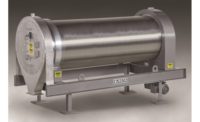Company: Munson Machinery Company
Website: www.munsonmachinery.com
Equipment Snapshot: A new sanitary Model RCM-60X20-SS Rotary Continuous Mixer from Munson Machinery blends primary bulk ingredients, minor ingredients and/or liquid additions uniformly in one to two minutes residence time (typical), at low cost per volume of material blended.
Unlike mixers that force agitators through stationary material, the Rotary Continuous Mixer design employs a 20 ft (6.1 m) long by 60 in. (152.4 cm) diameter rotating cylinder with internal mixing flights that impart a gentle tumbling action, distributing particles with each degree of drum rotation with no shear or heat generation, eliminating or minimizing degradation.
A 30 HP (22.4 kW) gear-reduced motor rotates the mixing drum at slow speeds on external trunnion rollers, minimizing energy consumption and eliminating the need for shaft seals.
The mixer’s stationary inlet and outlet allow hard connections to upstream and downstream process equipment, while an internal stainless steel spray line plumbed through the stationary discharge end permits liquid coating, de-dusting or perfuming of dry ingredients. Spraying of liquid additives onto a wide expanse of cascading material produced by the internal flights minimizes the time required to achieve uniform distribution.
A weir (dam) at the discharge end of the drum creates a residence bed of material that gently mixes as it travels through the drum, ultimately overflowing the weir and discharging at rates determined by the residence volume of the rotating cylinder and the rate of material inflow. A reversing discharge weir is available to evacuate material at the end of production runs.
All-stainless construction, smooth interior surfaces, the lack of shaft seals and unobstructed interior access, allow rapid sanitizing and inspection of all material contact surfaces.
Other models range in diameter from 16 to 72 in. (41 to 183 cm), and in length from 4 to 24 ft (122 to 732 cm).
Typical applications include bulk foods such as cereals, powdered drink mixes, snack foods and pet foods, and bulk chemicals such as detergents, catalysts, polymers, pesticides and fertilizers.












